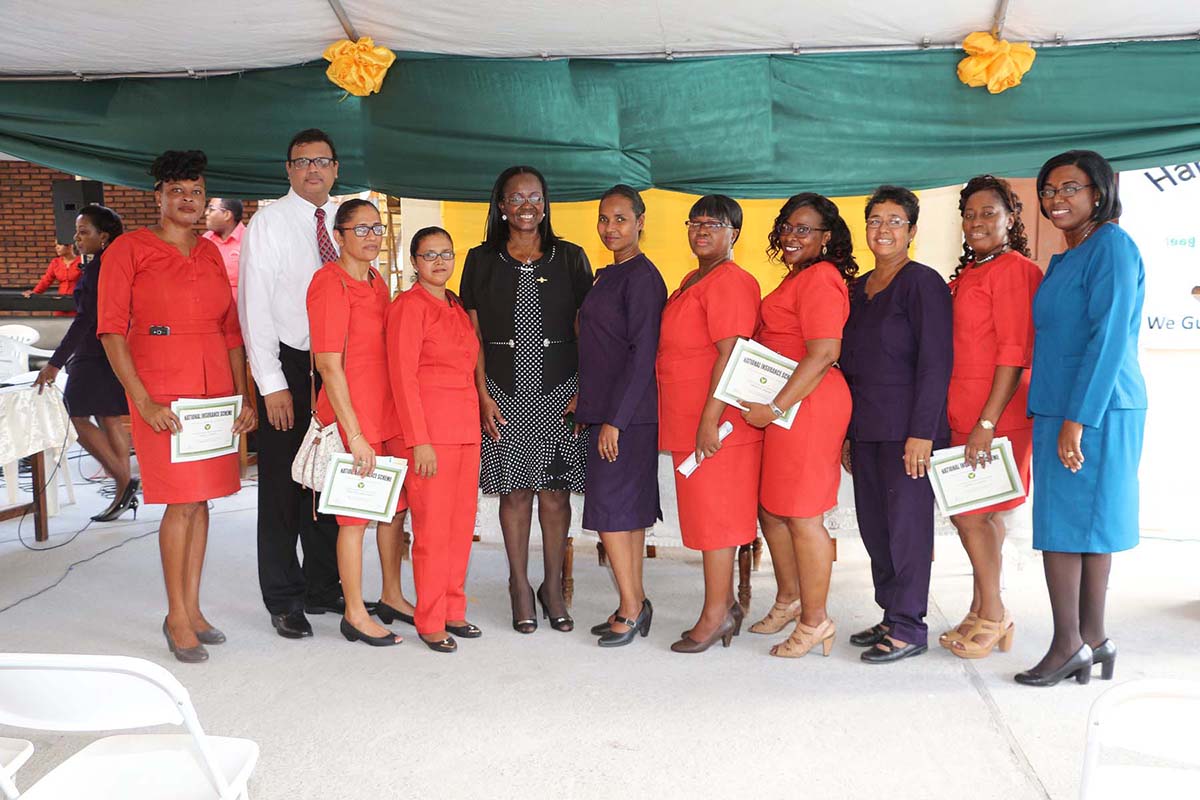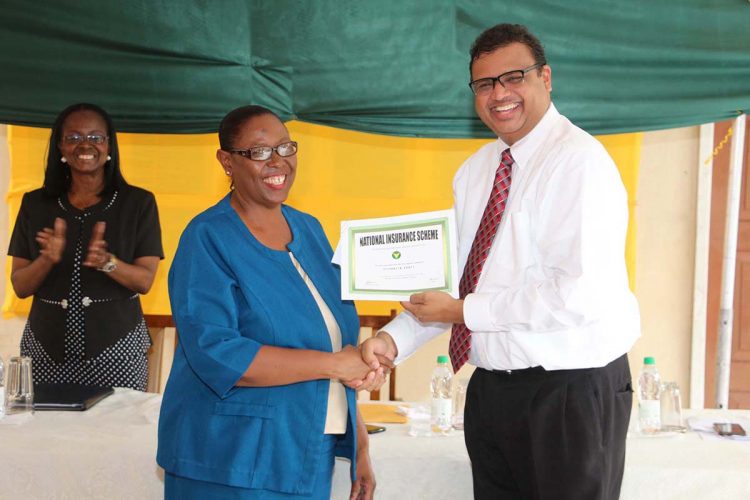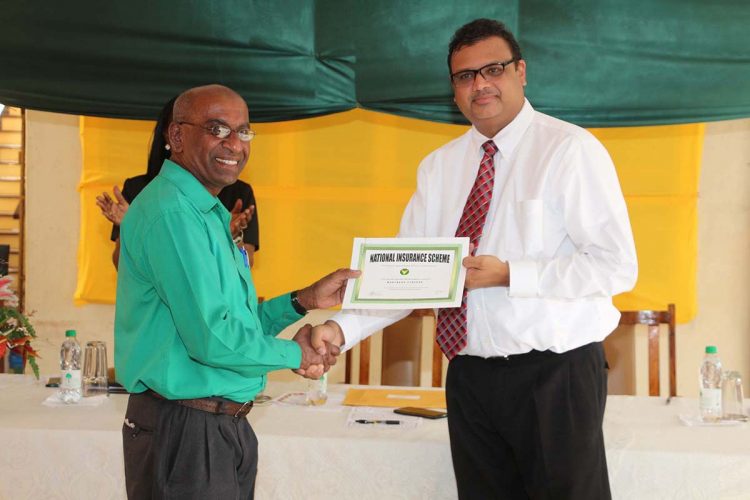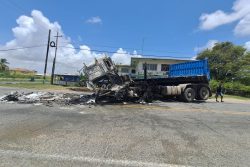The Chairman of the National Insurance Scheme (NIS), Dr Surendra Persaud has called on staff to ensure that by next year 95% of pensioners receive their monies directly at their banks and that 95 of payments to the Scheme are made electronically.
Speaking on Friday at the 48th anniversary of the Scheme at Brickdam and Winter Place, Persaud said by the time the 49th anniversary rolls around he also wants to see that 95% of pensioners can use digital technology to prove that they are alive, that 95% of the NIS’s other disbursements are printed on cheques that one can actually deposit into a bank and that 95% of claims are processed within 30 days.
“Right now the NIS spends an unacceptable amount of resources to collect money and to disburse benefits. In the near future this will be completely replaced by electronic transfers. I expect that very soon Guyana will have a digital financial window. A single digital space where all payment to the Government and its semi-autonomous bodies will be made”, the Chairman said in his speech, a copy of which was released by the NIS yesterday.
He also lamented the absence of an investment policy at the Scheme.
“The sad reality is that the NIS has not had an investment policy and frankly speaking this is one of the areas that the board has made very little progress. When the new board came into being the NIS did not even have an investment manager much less a department. Recently we have again placed an advert and hopefully we can find someone with the qualifications for this position”, he stated.
He noted that the NIS had made two investments that have been criticised over the years for a variety of reasons.
The Chairman pointed out that with the help of the Government of Guyana the CLICO loss had been addressed and over the next 10 years the NIS will recover a majority of the original principal, but would have lost out on the potential.
The second was the investment in the Berbice Bridge Company Inc (BBCI).
“I am happy to report that the NIS representatives on the BBCI board have been pushing for the NIS to receive the return on this investment. I anticipate that at least one of the Investments made by the NIS in the BBCI will be redeemed before the end of this year”, he disclosed.
He said he expected that in 2018 the board will spend a considerable amount of time on the investment portfolio of the NIS.
“It will be a two-step process, the first on the realignment of the portfolio with the Prudential Framework and then a relook at that framework to determine how it should be tweaked to meet the changing needs of the NIS”, he said. Earlier in his presentation, the Chairman reprimanded staff on a number of areas.
He noted that at the last anniversary he mentioned a case that was sitting on someone’s desk for years. “Thankfully after I mentioned that the case was resolved. But an NIS contributor should have never had to resort to the Board or its Chairman for their case to be resolved”, he declared.
He said that such a system will inherently breed corruption and incompetence. He said it was against this backdrop that he was giving other examples.
“What is (General Manager) Ms (Holly) Greaves to do when she finds that a senior employee has 1900+ unresolved matters on their desk, and thinking that it could not get worse she discovers that over 600+ are over 1 year old. What should Ms Greaves do?
“What should the board do when it requests reports for many consecutive months and the employee fails to deliver
“What should the board do when repeatedly and I mean for almost a year asks a senior manager to provide a report that does not regurgitate data but actually analyses and makes recommendations on that data.
“Please help me understand this. What was management doing that a building owned by the NIS and in the capital city was allowed to decay to the point where it had been deemed unfit for use”, the Chairman queried.
The firm which audited the NIS in 2015 said that some of its buildings were in a dire state and its head office should be closed temporarily for repairs.
The audit report by Ramesh Seebaran said:
“During our visits to the Head Office and some branches, we noted that the buildings were in dire need of repairs. The Head Office is in such a state, it should be closed temporarily for extensive repairs and maintenance. Currently, the state of the building poses a health risk to employees and have affected equipment, furniture, records etc. Whenever it rains, employees, equipment, furniture, records have to be relocated/shifted to prevent further damage because of the leaking roof and the flooding of the compound and surrounding area.
“Our audit started during the May-June rainy season and we observed first hand at the Camp Street and Brickdam locations, the leaking roofs and the soaking of furniture as well as records.
“In some cases, buckets were placed to collect the water from spreading further into the buildings which had to be emptied every fifteen minutes. According to management this was a norm whenever it rains…
“Further, we witnessed how the pension files stored at Brickdam were being soaked by flood water as it rain water seeped through the roof and by sewage water rising from the ground. In some cases the records/files were damaged to such an extent that it required employees to wear masks and gloves to protect their health before handling them.
“This situation is also prevalent at the branch offices in New Amsterdam, Port Mourant and Fort Wellington. It addition, the branch in Melanie encounters some of the aforementioned effects to a smaller extent, as the front yard floods whenever it rains.”
The Chairman yesterday said he was sorry he seemed to be beating up on management but it is management’s responsibility to manage the organization.
He said however the NIS has begun to change course.
“The GM has the full support of the board as she charts a new path for the NIS. A path based upon appropriate performance measures and competence. As I said last year and I say again, please ask yourself if the NIS is a right fit for you”, he said.












